|
|
|
Sort Order |
|
|
|
Items / Page
|
|
|
|
|
|
|
| Srl | Item |
| 1 |
ID:
119965
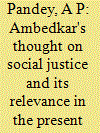

|
|
|
| 2 |
ID:
130964
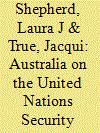

|
|
|
|
|
| Publication |
2014.
|
| Summary/Abstract |
Until 2015, Australia is uniquely positioned on the world stage to make a real difference to women's lives in conflict, transitional and post-conflict countries by ensuring they are actively represented in all peace negotiations1. The Australian government has secured not only a non-permanent seat on the United Nations Security Council (UNSC), but also a seat on the Executive Board of UN Women, the UN entity charged with enhancing gender equality and the empowerment of women. These represent two internationally significant avenues through which the Australian government can fulfil its promise to engage women in the governance of international peace and security, furthering the UN's Women, Peace and Security (WPS) agenda. This agenda, the primary architecture of which comprises seven interrelated UNSC Resolutions dating back to UNSC Resolution 1325 (2000), mandates that women should be represented at and actively participate in all peace negotiations, as well as making binding international commitments to eliminate violence against women and protect women's rights
|
|
|
|
|
|
|
|
|
|
|
|
|
|
|
|
| 3 |
ID:
091174


|
|
|
| 4 |
ID:
058800


|
|
|
| 5 |
ID:
119975
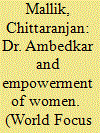

|
|
|
| 6 |
ID:
119979
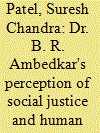

|
|
|
| 7 |
ID:
106539
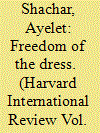

|
|
|
| 8 |
ID:
102693
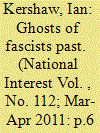

|
|
|
|
|
| Publication |
2011.
|
| Summary/Abstract |
A PROMINENT British government minister, Baroness Warsi, herself a Muslim, claimed just recently that Islamophobia has "passed the dinner-table test" in Britain and is seen by many as normal and uncontroversial. She warned of growing intolerance, prejudice and bigotry toward the Muslim faith and its adherents. In reply, some religious and social commentators have suggested that growing numbers of Muslims in Britain give rise to legitimate concerns. They have asked whether strict adherence to the Islamic faith is compatible with the values of Western democracies.
|
|
|
|
|
|
|
|
|
|
|
|
|
|
|
|
| 9 |
ID:
120868
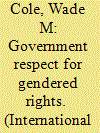

|
|
|
|
|
| Publication |
2013.
|
| Summary/Abstract |
Using two-stage least-squares regression models, I analyze the effect of the Convention on the Elimination of All Forms of Discrimination against Women (CEDAW) on rated levels of respect for women's rights. The results show that CEDAW has a strong positive effect on women's political rights, no effect on economic rights, and a partially negative effect on social rights. Detailed analyses of political outcomes reveal that CEDAW membership was associated with an increase in the share of women in national parliaments but had no effect on the likelihood that governments adopted legislative quotas guaranteeing female representation in parliament. CEDAW was also more effective for some kinds of countries than others. Post-ratification improvements were particularly strong in democratic countries and countries with extensive linkages to women-focused international organizations, but CEDAW proved ineffective in Muslim polities and societies. The paper evaluates the implications of these findings and proposes new avenues for research.
|
|
|
|
|
|
|
|
|
|
|
|
|
|
|
|
| 10 |
ID:
190801


|
|
|
|
|
| Summary/Abstract |
The six Gulf Cooperation Council (GCC) countries have received criticism for being slow to conform to global human rights norms. They have lagged in signing global treaties and covenants and have not enforced many of the laws they have on the books. However, for three key reasons, hope exists that continued engagement with these countries on human rights issues may lead to progress. First, despite a lack of progress in some areas, such as political and civil rights, the region has made great progress overall in just a few decades, especially regarding economic and social rights. Second, GCC countries have begun incorporating human rights language into domestic legislation and their own local discourse. Third, economic and social changes are on the horizon for the region in the medium to long term, which may lead to political changes in the next few decades.
|
|
|
|
|
|
|
|
|
|
|
|
|
|
|
|
| 11 |
ID:
130967
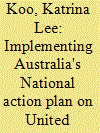

|
|
|
|
|
| Publication |
2014.
|
| Summary/Abstract |
Australia's victory in securing temporary seats on the United Nations Security Council and the United Nations Executive Board has been much celebrated. This provides an important platform for Australia to further the agenda of women's rights worldwide. As part of this agenda, Australia has provided a commitment to implement United Nations Security Council Resolution 1325 on Women, Peace and Security through the development of the National Action Plan on Women, Peace and Security 2012-2018, released in 2012. This article examines the early thoughts and efforts towards the implementation of this plan. It demonstrates that while there is a broad rhetorical commitment to implementation by Australian actors, there are nonetheless challenges that may threaten its success. Based in part upon interviews with Australian government representatives and policy makers, and activists and advocates of the Women, Peace and Security agenda, this article highlights the success, challenges and opportunities that have so far been associated with implementing this important Resolution.
|
|
|
|
|
|
|
|
|
|
|
|
|
|
|
|
| 12 |
ID:
174995
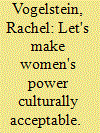

|
|
|
| 13 |
ID:
130966
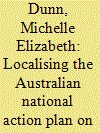

|
|
|
|
|
| Publication |
2014.
|
| Summary/Abstract |
In the bid for a non-permanent seat on the United Nations (UN) Security Council, the Australian government emphasised international peace and security and Indigenous peoples as two of the eight key elements supporting its nomination. Australia's positive track record in support of the UN Women, Peace and Security (WPS) agenda, including the delivery of an Australian National Action Plan (NAP) along with recognition of historical injustices to Indigenous Australians, was highlighted as a valid and important argument in favour of its nomination. The Australian NAP, however, has all but ignored the local context in its development and application, focusing instead on its commitments abroad. This framing of the Australian NAP is informed, firstly, by the WPS agenda policy framework applying to conflict and post-conflict situations, and, secondly, by its location within the UN mandate, requiring those situations to be internationally recognised. This article applies Nancy Fraser's tripartite justice framework to reveal that the Australian NAP gives rise to the political injustice of 'misrepresentation' in relation to intra-state (violent), domestically situated Indigenous-settler relations, which are denied the status of ongoing internationally recognised conflict. The author suggests that the remedy to this injustice is to reframe and recognise the conflict status of Indigenous-settler relations in the localisation of the Australian NAP. This localisation creates openings for Indigenous Australian women to engage with the WPS agenda in meaningful ways.
|
|
|
|
|
|
|
|
|
|
|
|
|
|
|
|
| 14 |
ID:
066384


|
|
|
| 15 |
ID:
141682


|
|
|
|
|
| Edition |
1st ed.
|
| Publication |
New Delhi, Rupa and Co., 1994.
|
| Description |
x, 206p.hbk
|
|
|
|
|
|
|
|
|
|
|
|
Copies: C:1/I:0,R:0,Q:0
Circulation
| Accession# | Call# | Current Location | Status | Policy | Location |
| 035337 | 923.254/SIN 035337 | Main | On Shelf | General | |
|
|
|
|
| 16 |
ID:
188427
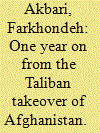

|
|
|
|
|
| Summary/Abstract |
One year on from the Taliban’s takeover, what has changed in Afghanistan? Why has re-instituting a gender apartheid regime been so central to the Taliban 2.0’s (Taliban 2.0 refers to the second version of the Taliban that came to power in August 2021. The first Taliban rule were from 1996 to 2001.) consolidation of power in Afghanistan since August 2021? We address these questions by explaining how gender has become a salient feature of multi-level power struggles in Taliban-ruled Afghanistan. First, we examine the changes experienced by women and girls over the past year under the second Taliban regime. Second, we consider four types of power struggles—in international relations, in transnational politics, within the Taliban organisation, and between Afghan men and women—that constrain the realisation of women’s rights and security. Finally, we suggest politically necessary actions for Australian Government to support the women and girls of Afghanistan in line with its value-based foreign policy and multilateral commitments.
|
|
|
|
|
|
|
|
|
|
|
|
|
|
|
|
| 17 |
ID:
130968
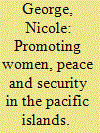

|
|
|
|
|
| Publication |
2014.
|
| Summary/Abstract |
How has the Women, Peace and Security agenda been advanced in the Pacific Islands? While some observers argue that this region suffers from a contagion of unrest, violence and state weakness, these estimates commonly ignore the vital work women have performed in the region as promoters of peace and security. Even when such activity places them in direct personal danger, women across the region have spearheaded efforts to bridge communal boundaries and challenge the increasing normalisation of violence, gendered and otherwise, that accompanies threatened or actual incidents of conflict. As this article demonstrates, these efforts have had profound impacts on the ground in conflict-affected Pacific Island countries. They have also received increased recognition at the level of institutional politics, with member states of the Pacific Islands Forum recently accepting a Regional Action Plan on Women, Peace and Security. This has been hailed as a significant achievement for the region's women peacebuilders. But much of this plan is focused on women's contributions to peacebuilding at the pointy end of a crisis. This overlooks the extent to which the 'slow violence' of environmental degradation, masculinised politics and militarism also compound gendered insecurity in the region. Attention to these issues offers a contradictory picture of the gains made in promoting the Women, Peace and Security agenda in the Pacific Islands. While this advocacy framework has provided important opportunities for the region's women peacebuilders, it may also have discouraged broader reflection on the prevailing structural conditions at work across the region which function in an attenuated fashion to undermine women's security and the achievement of a gendered regional peace.
|
|
|
|
|
|
|
|
|
|
|
|
|
|
|
|
| 18 |
ID:
130509
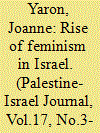

|
|
|
|
|
| Publication |
2011.
|
| Summary/Abstract |
what we know today as the state of Israel was not really established as an independent state in 1948 following what is called the "war of independence. It was established slowly, step by step, by waves of Jewish Immigration to what was then know as Palestine, a province of the fading Ottoman Empire. At the time, the main source of this immigration were Czarist Russia and the United Kingdom.
|
|
|
|
|
|
|
|
|
|
|
|
|
|
|
|
| 19 |
ID:
119983
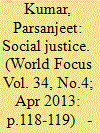

|
|
|
| 20 |
ID:
130970
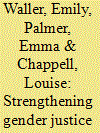

|
|
|
|
|
| Publication |
2014.
|
| Summary/Abstract |
Many conflicts in the Asia-Pacific region have included sexual violence crimes targeted primarily against women. However, in comparison to other regions, Asia-Pacific states have been reluctant to embrace international law innovations to end impunity for such crimes into the future, as evidenced by their unwillingness to become signatories to the Rome Statute of the International Criminal Court. Of the 39 countries constituting the Asia-Pacific region, only 17-less than half-have joined the Rome Statute. This article initially surveys some of the reasons for non-ratification of the Statute. It further examines the role of civil society and the potential normative impact of the Statute to enhance national sexual violence legislation and prosecutions. Finally, it identifies some practical steps that the Australian government could take to encourage regional states to ratify, implement and enforce the Rome Statute in order to further protect all victims of international crimes and bolster the broader Women, Peace and Security framework.
|
|
|
|
|
|
|
|
|
|
|
|
|
|
|
|
|
|
|
|
|